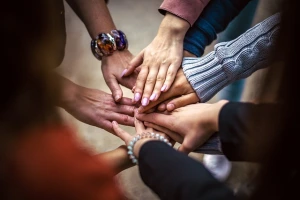"I am committed to mothers and people who do caring work!" That's how I usually describe my social commitment. And was recently asked who I actually mean by "mothers".
In Cologne, where I lived for around twenty years, or in other large cities, this question may have a different meaning than in the small town where I have been living for around three years. Is my idea of being a woman and mother "inclusive" enoughacademics and women who have been studying motherhood and the role of the mother from a sociological perspective for a long time ask me. Do I consider that not every mother is a biological mother? There are social mothers who love their child as adoptive, step or foster mothers or as a woman's partner and take responsibility for it in everyday life. There are women* who did not give birth to their child themselves and still care for it as mothers. There are women who have no children at all, but still care for others on a daily basis. Do I mean all of them when I talk about mothers and people with caring responsibilities? My clear answer: YES!
Because my everyday life in a small town for around three years has shown me that the problem is not the definition of being a woman or a mother. The problem is that - outside of a small feminist bubble - there are are almost exclusively women (or "female read people") who do the lion's share of care workas mothers, grandmothers or social mothers. In the neighborhood, at the kindergarten bazaar and at elementary school. Before, during and in addition to their gainful employment. They are women and mothers who organize the lives of their relatives, who are there when their child is feverish, who pick up the teenager from the party at night, who support their daughters and daughters-in-law as grandmothers when daycare and school are once again cancelled. Daughters and daughters-in-law who care for their elderly relatives. They are women and mothers who, even in the event of a separation, are largely responsible for their children on a day-to-day basis and whose children far too often do not receive the maintenance they are entitled to. It is women and mothers who, after years of caring for their relatives, often find themselves alone at the end of their lives and, if things go badly, lonely and impoverished.
And it really doesn't matter whether I'm talking about biological mothers or mothers who accompany and raise their child as a social mother.
The problem is the assumption, that care is something that can be taken for granted, that can be provided just like that and under all circumstances. Girls and women have this in their blood, so to speak, and it can be demanded of them quite automatically - far more than of boys and men. The problem is that people are forced into roles based on their gender and often don't even question this. And that debates about sex and gender are far removed from this. Because it's about something completely different - namely the everyday and barely questioned devaluation and trivialization of care work.
I can't help but think of this in some of the heated discussions about the question "What is a woman and a mother anyway?", which are mainly held in urban and academic circles.
In "normal" life, women and mothers need financial security and protection from violence, health care to which they have access regardless of their origin and social status. Women and mothers need Political participation and fairly distributed responsibility within families.
I am committed to all of this in my work as a journalist and author and as co-initiator of the nationwide Campaign #Hundred thousand hutr in. For a society that puts care at the center - and the people who provide it every day. My conclusion: We should not argue about who mothers are, but ask what they need - and how we can achieve what they need in all their diversity!
Best wishes for Easter, Sarah Zöllner
The author is a freelance journalist, Author for family and social issues and mother of a kindergarten and a primary school child.
Click here for Sarah's blog mother-and-son
